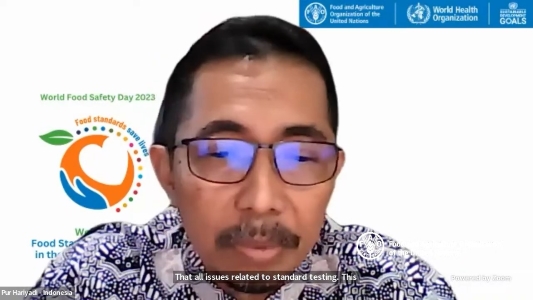Guaranteeing Food Safety, Prof Purwiyatno Hariyadi Explains the Importance of International Cooperation in Compiling Codex Food Standards

Food standards are one of the important aspects in ensuring food safety for consumers. To guarantee these standards globally, the Food and Agriculture Organization (FAO) created the Codex Alimentarius or the Food Code.
Prof Purwiyatno Hariyadi, Professor of Food Technology at IPB University who also serves as Vice Chairperson of the Codex Alimentarius Commission, revealed that the preparation of food standards and their implementation for each country still faces various challenges. Among other things, it relates to the lack of participation of member countries, the lack of human resource (HR) capacity and the lack of expert capacity in many of the countries involved.
He considers that the knowledge and participation of policy makers, food business operators, academics and consumers is very important to facilitate the development of appropriate food standards for each country.
“Food safety is very important to ensure that the food consumed is always safe. The safety is achieved with the prerequisites set for the food. Every party in the food industry must realize the importance of food standards so that they reach consumers safely,” he said in the Webinar on Food Standards and Codex in Asia and the Pacific, World Food Safety Day 2023 which was held by the World Health Organization, recently.
Close HR participation, he said, would make it easier for policy makers to develop a national food control system. For example through scientific assessment or commenting on standard drafts. Furthermore, it can be proposed to update the existing Codex food standards.
“The capacity and participation of experts are also needed to build a discussion on codex standards because the topic is very scientific and broad. Therefore, every country must prioritizes this,” he said.
“We also have to inform this (Codex standard) to as many parties as possible. Both in government, consumer groups to academia,” he added.
Moreover, said Prof Purwiyatno Hariyadi, the food system in developing countries is not very sophisticated yet, so it is a challenge in itself. There is also a language barrier, thus in-person meetings in the Pacific region are not small problems.
“Proposing and drafting Codex food standards can take up to years. Therefore, a multi stakeholders’ cooperation is needed so that its adoption and implemented by all parties can be guaranteed,” he concluded. (MW) (IAAS/SHY)


